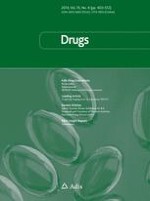Erschienen in:

01.09.2004 | Adis Drug Evaluation
Insulin Aspart
A Review of its Use in the Management of Type 1 or 2 Diabetes Mellitus
verfasst von:
Neil A. Reynolds, Antona J. Wagstaff
Erschienen in:
Drugs
|
Ausgabe 17/2004
Einloggen, um Zugang zu erhalten
Summary
Abstract
Insulin aspart (NovoRapid®, NovoLog®) is a short-acting insulin analogue, which has a faster onset and shorter duration of action than regular human insulin.
Insulin aspart administered immediately before meals provided significantly greater improvements in glycosylated haemoglobin and better postprandial glycaemic control than regular human insulin administered 30 minutes before meals, when used in a basal-bolus regimen with neutral protamine Hagedorn (NPH) insulin, in randomised, nonblind studies in patients with type 1 diabetes mellitus.
In patients with type 2 diabetes, insulin aspart provided similar glycaemic control to regular human insulin, administered in a basal-bolus regimen with NPH insulin. Small studies suggest that the use of insulin aspart in combination with oral hypoglycaemic agents may be beneficial. Insulin aspart, administered by continuous subcutaneous insulin infusion (CSII) provided better glycaemic control than insulin aspart multiple daily injection regimens in patients with type 1 (but not type 2) diabetes, and had similar efficacy to CSII with insulin lispro or regular human insulin in type 1 diabetes. Limited studies show insulin aspart to be effective in children, adolescents and young adults with type 1 diabetes.
Insulin aspart had a tolerability profile similar to that of regular human insulin in clinical trials. The incidence of major or nocturnal hypoglycaemic events reported in patients receiving insulin aspart was lower than that of regular human insulin in several studies.
In conclusion, insulin aspart, administered immediately before meals in a basal-bolus regimen with NPH insulin, provided better long-term glycaemic control than regular human insulin administered 30 minutes before meals in patients with type 1 diabetes, and was as effective as regular human insulin in patients with type 2 diabetes. A significantly lower risk of hypoglycaemia was seen in several trials. Insulin aspart CSII provided better glycaemic control than insulin aspart multiple daily subcutaneous injection (MDI) in patients with type 1 (but not type 2) diabetes and had similar efficacy to CSII with insulin lispro or regular human insulin in type 1 diabetes. Insulin aspart is an effective and well tolerated alternative to regular human insulin and insulin lispro for the maintenance of glycaemic control in patients with type 1 or 2 diabetes.
Pharmacodynamic Profile
The substitution of one amino acid in human insulin to make insulin aspart, a short-acting insulin analogue, facilitates absorption following subcutaneous administration.
Glycaemic control (24-hour) with insulin aspart, administered immediately before meals, was at least as good as that with human insulin and similar to that with insulin lispro in clinical studies involving adult patients with type 1 (and some with type 2) diabetes. The duration of action of insulin aspart is shorter than that of human insulin. However, administration of insulin aspart immediately before or 15 minutes after a meal appears not to affect glycaemic control.
Postprandial glycaemic control was more effective with insulin aspart than with regular human insulin in patients with type 1 diabetes, but there were no differences between these treatments in patients with type 2 diabetes. Postprandial glycaemic control was similar in patients with type 1 diabetes receiving insulin aspart, insulin lispro or regular human insulin by CSII. In patients with type 2 diabetes, similar improvements were seen with multiple-dose or CSII insulin aspart administration.
Pharmacokinetic Profile
Insulin aspart exhibits linear pharmacokinetics. Subcutaneous insulin aspart is absorbed faster than human insulin, although bioavailability is similar. Insulin aspart is eliminated more quickly from the body than human insulin, but total plasma clearance is the same. The pharmacokinetic parameters of insulin aspart and insulin lispro are similar.
In healthy volunteers, insulin aspart was associated with significantly lower interindividual variability in several pharmacokinetic properties. Insulin aspart was absorbed faster than regular human insulin following subcutaneous administration in children and adolescents. Hepatic or renal impairment does not appear to alter insulin aspart pharmacokinetics.
Therapeutic Efficacy
Insulin aspart, administered immediately before meals, provided small but significantly greater improvements in glycosylated haemoglobin (HbA1c) than regular human insulin, administered 30 minutes before meals, when used with NPH insulin in a basal-bolus regimen in three studies of 12–52 weeks’ duration in patients with type 1 diabetes; equal efficacy was seen in a 64-week trial. In an extension to one trial, insulin aspart maintained superiority over regular human insulin at 2.5 years. Glycaemic control was more effective in patients receiving insulin detemir plus insulin aspart than in those receiving NPH insulin plus regular human insulin and as effective as NPH insulin plus insulin aspart in 16-to 18-week studies. In two large, 12-or 26-week trials in patients with type 2 diabetes, insulin aspart showed similar glycaemic control to regular human insulin administered with NPH insulin in a basal-bolus regimen.
Insulin aspart, insulin lispro and regular human insulin provided similar glycaemic control at 16 weeks in patients with type 1 diabetes when administered via CSII. Insulin aspart CSII provided better glycaemic control than insulin aspart MDI regimens in patients with type 1 diabetes and similar efficacy in patients with type 2 diabetes.
In a 12-week study in patients aged 7–17 years, insulin aspart provided similar glycaemic control to regular human insulin when administered in a basal-bolus regimen with NPH insulin. Insulin aspart CSII provided better glycaemic control than once-daily insulin glargine in patients aged 8–21 years with type 1 diabetes.
Tolerability
Insulin aspart had a tolerability profile similar to that of regular human insulin in patients with diabetes. The incidence of hypoglycaemic events reported in patients receiving insulin aspart was generally similar to that of regular human insulin. However, insulin aspart had a significantly lower incidence of nocturnal hypoglycaemic events in several studies and of major hypoglycaemic episodes in one trial. The incidence of other adverse events and immunogenic response did not differ from that seen with regular human insulin.